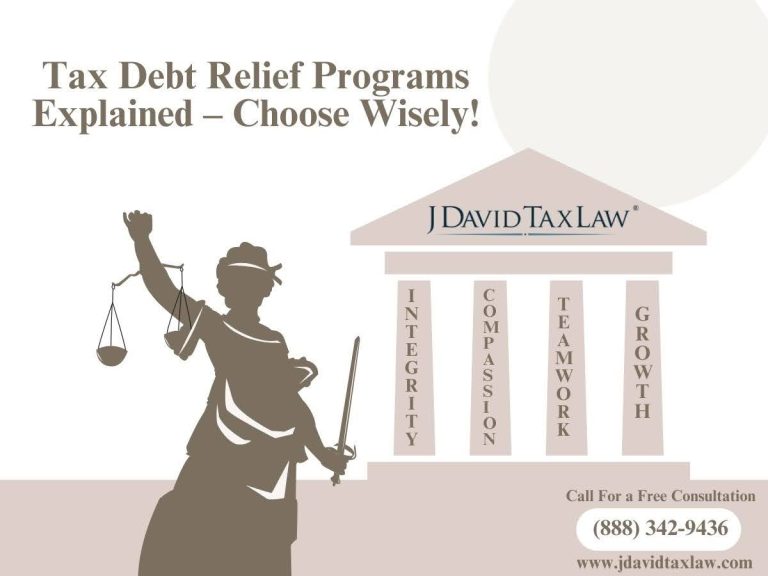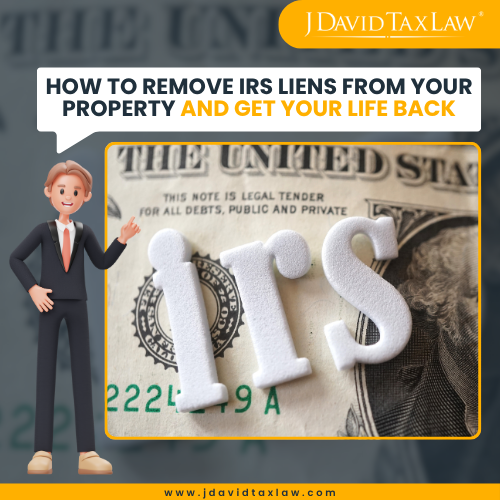
Yes, a tax attorney can negotiate with the IRS on your behalf,reducing penalties and resolving tax debt.Call our IRS tax relief attorney at (888) 342-9436.





Tax debt doesn’t just stay still; it grows due to penalties and added interest, turning into a significant burden. It’s important to look into all tax debt relief options carefully to find the right one for your financial situation. This includes considering tax relief programs that can reduce the total debt or even offer terms that better suit your current financial condition. There are several IRS forgiveness plans and tax forgiveness programs designed to help people manage their tax liabilities. For those facing financial hardship, options like installment agreements or payment plans can offer a way to spread out tax payments over time.
Tax debt relief programs provide ways for individuals to manage their tax debts. With IRS repayment plans, for example, taxpayers can set up a payment schedule that doesn’t add more penalties. Tax relief isn’t just about scheduling payments. Sometimes, the IRS might let taxpayers settle their debts for less than they owe through something called an offer in compromise.
Handling tax debt is vital to avoid severe problems like losing part of your wages to the IRS or having your bank accounts and properties seized. The IRS’s Debt Forgiveness Program offers crucial support and tools for those who qualify, helping them to avoid such drastic measures and clear their tax liabilities effectively.
Tax debt relief programs are designed to help taxpayers settle their federal tax debts and avoid the penalties and fees that can accumulate over time. These programs provide various options tailored to meet an individual’s financial situation, ensuring compliance and preventing severe consequences like wage garnishment or other legal actions. The five common tax debt relief programs are:
IRS Payment Plans: These plans allow taxpayers to pay off their tax obligation over time.
Offers in Compromise (OIC): This option enables eligible taxpayers to settle their tax debts for less than the amount owed.
Currently-Not-Collectible (CNC) Status: If taxpayers can prove they are facing financial hardship, the IRS may determine that their debt is currently not collectible, temporarily halting collection actions.
Penalty Abatement: Taxpayers who have a reasonable cause for failing to meet their tax obligations may qualify for relief from penalties.
Tax Relief Providers: Specialized companies offer professional services to assist taxpayers in dealing with their tax debts.
When considering these relief programs, it’s advisable to consult with a tax professional, such as a certified public accountant (CPA) or a tax attorney who is experienced in IRS negotiations and can guide individuals through these complex programs.
If you are struggling with IRS debt, don’t face it alone. Take the first step towards resolving your tax issues by scheduling a free consultation with us. Let J David Tax Law be your ally in fighting for the tax relief you deserve.
The IRS accommodates taxpayers through two categories of payment plans—a short-term payment plan and a long-term installment agreement.
The short-term plan permits balances up to $100,000 to be settled within 180 days.
The long-term plan, also known as an installment agreement, allows taxpayers with balances under $50,000 a period of up to 72 months to pay off the debt. Monthly payments are necessary, with direct debit required for debts over $25,000.
These IRS payment plans are like personal loans. They let taxpayers repay tax debts in small parts. The parts include interest and fees. Taxpayers must meet specific criteria about the balance owed. They must also show consistent tax compliance to qualify.
Taxpayers dealing with significant financial hardship, who have also filed all required tax returns, may be eligible for the IRS’s tax debt forgiveness program. A key feature of this program is the Offer in Compromise (OIC). This option is available for taxpayers who owe $10,000 or more and are unable to pay the full amount due to their financial situation.
This program not only offers a chance to reduce the debt but also allows for consolidating multiple tax debts into one monthly payment. This can help improve a taxpayer’s credit score over time by ensuring consistent payments. The main goal of the IRS tax debt forgiveness program is to help taxpayers manage their tax liabilities more effectively while providing relief from ongoing penalties and the accrual of interest. This makes it an essential option for those seeking a way to handle their tax obligations without worsening their financial predicament.
Taxpayers facing significant tax debts or intricate tax issues may benefit from the expertise of a tax relief company. These companies specialize in handling complex tax situations, including large debts, multiple accounts, substantial assets, or several years of unpaid taxes.
When choosing a tax relief company, it’s important to proceed with caution. Fees can vary, typically based on the amount of debt or an hourly rate. It’s essential to research the company’s reputation to avoid those that charge excessive fees, require upfront payments, or offer unrealistic promises. Some firms might not be reputable, so conducting thorough research and due diligence is critical before committing to their services.
For those with substantial tax debts, another option could be to leverage home equity through loans or credit lines. However, this approach uses your property as collateral and requires careful evaluation of the potential risks and consequences.
Before considering tax debt relief programs, it’s important to conduct a thorough review of your financial situation. Assess your income, expenses, liabilities, and overall debt to fully understand your current financial status, particularly in relation to your tax obligations. To be eligible for these initiatives, you must be in good standing with the IRS, which includes having all tax returns filed and up-to-date.
If you’re dealing with tax debts, it’s crucial to assess your financial situation carefully, including all your outstanding tax liabilities. When considering help from a tax relief company, remember that their fees might be based on the total amount of your tax debts or could be charged at flat hourly rates. Those facing large tax debts, complex tax histories, or multiple assets might find the specialized knowledge of these companies beneficial. For simpler tax issues, like a missed tax payment from a previous year, directly contacting the IRS could be a more affordable option. Also, exploring options such as bankruptcy might be relevant, as it can sometimes clear certain tax debts under specific conditions.
Financial hardships, whether caused by unemployment, health issues, or the aftermath of a natural disaster, can make it difficult to manage your tax debts. The IRS offers programs tailored to accommodate such situations, providing payment plans and debt settlements designed to match your financial capabilities. These programs aim to divide your sizable tax debt into manageable payments or to allow for a settlement at an amount that fits your financial situation. It’s important to clearly communicate your financial struggles to the IRS or a tax relief provider to identify the best option for repaying your tax debt.
The tax lawyers at J David Tax Law are experienced at tax relief programs such as the Fresh Start Program. If you have a tax debt and suspect that the Fresh Start Initiative may be of assistance to you in alleviating the effects of that debt contact us today at (888) 342-9436.
There’s a common misconception that tax debts and liens directly affect your credit score. While tax debts are not reported to credit bureaus, a tax lien—previously made public—could influence loan applications as lenders might find this information, even though it does not appear on your credit report. Moreover, borrowing funds to cover tax debt might indirectly affect your credit score. Engaging a tax relief company won’t directly impact your credit score since negotiations and settlements deal with debts that are not considered by credit bureaus. However, it’s advisable to be cautious when borrowing or changing property statuses to manage tax debt, as these actions might indirectly affect your creditworthiness.
When considering applying for tax relief, it’s pertinent to start by reviewing your tax returns and payment history.
Acknowledging your financial situation will inform your choice of payment plan for tax debt relief. The options include both short-term and long-term plans.
Payment Type | Eligibility | Repayment Duration | Specific Requirement |
Short-term | Balances < $100,000 | Up to 180 days | None |
Long-term | Balances < $50,000 | Up to 72 months | None |
Long-term (Direct) | Balances > $25,000 | Custom | Direct debit payments |
Starting the tax debt relief application process requires careful preparation, including ensuring all your tax returns are current. It’s important to understand that tax liens may remain until the IRS approves your offer-in-compromise and you have fulfilled the agreed settlement terms. Also, if you are in the middle of a bankruptcy proceeding, you might not qualify for relief.
Getting help from a tax professional isn’t mandatory, but their expertise can be very useful in dealing with the complexities of the application process. Make sure all your documents are organized, as this will help streamline your application with the IRS. Once you submit your application, the IRS usually stops collection activities until they make a decision, giving you some relief.
To find out if you qualify for tax relief programs, including the Offer in Compromise, contact J David Tax Law today. Our experienced tax attorneys will fight for you and keep you informed throughout the process.
Our tax relief attorneys specialize in tax problems and tax debt resolutions
Get started with a 100% free consultation

Yes, a tax attorney can negotiate with the IRS on your behalf,reducing penalties and resolving tax debt.Call our IRS tax relief attorney at (888) 342-9436.

Struggling with IRS and state tax debts? Learn how to deal with your situation without missing deadlines or risking enforcement. Call (888) 789-5011 for a free consultation!

Remove IRS tax liens through payment, withdrawal, discharge, or subordination. Learn which option fits your situation. Call (888) 789-5011 for free legal consultation.
Get IRS Tax Assistance Within 24 Hours